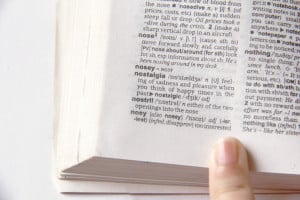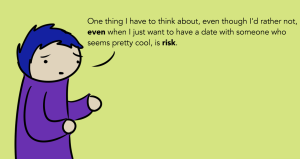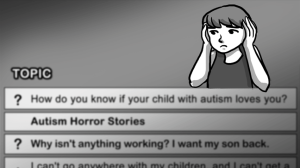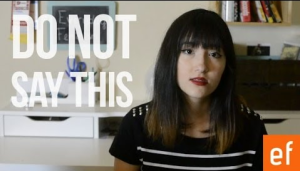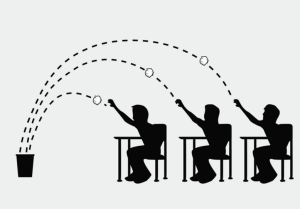
A parent sits on the edge of their bed as their child kneels before them, resting their hand on their parent’s comfortingly.
Originally published on xoJane and republished here with their permission.
(Content Warning: addiction, alcohol use)
Whenever I say it, I get the Look.
Faces turn immediately sympathetic as whomever I am talking to says some variation of “poor thing” or “Are you okay?”
This past year, I sent my mother to rehab.
Addiction is something that I always knew ran in our family. I knew that there were risks, and I knew that if I didn’t pay attention, I could find myself looking at the bottom of a bottle.
Over the years, I spoke with many people about it – friends, family, and therapists. I always said that I was afraid that I would grow up to be an alcoholic, but I wasn’t really ever ready to talk about why.
Addiction was the elephant in the room, or sometimes the elephant sitting on my chest when I woke up sweaty at night, desperately reaching for the other side of the pillow.
I had known for years that my mother was struggling with alcoholism. I saw the day-to-day realities of the disease firsthand. I’m sure some of you know exactly what it’s like growing up with an alcoholic, but for those of you that don’t, I’ll let you in on the details (at least the details of my particular alcoholic).
Many days looked normal. It was in the evenings that things changed, in relation to the number of glasses of wine that she drank.
I learned to be quiet, to try my hardest not to spill milk on the table, to head straight to bed if she had more than three drinks.
It wasn’t that my mom had to drink every day. It was that if she drank one glass of wine, she was going to drink the whole bottle.
As a child, I didn’t have the tools to understand that there were two personalities hiding inside my mom. There was the mom who drove me to soccer practice, and there was the mom who was perpetually angry, screaming and raging into the night if things didn’t go exactly according to her plan.
As a teen, I cried with embarrassment after mom picked a date and me up from the movies drunk and ran over a light in his front yard.
As a young adult, I was thankful for a boyfriend who held me after my mom told me, “Go fuck yourself” on my 21st birthday. The next year, it was the same boyfriend who talked me down after my mom visited us on the West Coast and took the opportunity to tell him that she thought he was a “nobody going nowhere.”
As a mid-twenty-something, I maintained a baseline stress about what was happening at home while I was away.
Over the course of those years, each time her alcoholism was brought up, we somehow swerved out of the conversation, sweeping the issue back under the rug.
But these things never last. You can only gloss over the truth for so long.
Addiction is a disease that will not go away when ignored. Instead, it digs its claws deeper into your life with each day that passes.
Growing up, and well into my adult life, I chose to keep the fear to myself. I painted myself into a corner where I felt like I couldn’t really tell anyone what was happening. I didn’t want to betray my mother, but I also didn’t want to admit that I hadn’t done anything to try to make her change.
By keeping this all to myself, I denied myself the help that I needed.
This past Thanksgiving, emotions ran high at home, spurred on by the addition of wine. It was the classic story in our household – a family dinner gone wrong.
It was mom with a few glasses of wine, then a few glasses more. The lightning-fast anger bubbling up inside of her broke free of its reins after glass six. An argument snowballed, bitter words were exchanged, children retreated, and a war waged between mom and my (soon to be ex-)step-father.
After years of ignoring the problem, I woke up the next morning knowing that I had to say something. The night before had left me feeling emotionally spent and burned out on the bullshit.
I knew that there were two choices: I could never come to another family dinner, or I could suit up and address the problem. It was time.
Close your eyes for a moment and picture your mother. Now, picture yourself sitting on your childhood bed, facing her across the room.
You know that the time has come and gone for gentle conversation. You know that tomorrow you will get on a plane, you will fly across the country back to the life you are living day by day, and you will no longer have eyes on the ground at home. You know that the time is now – or never.
You know that addiction is living in your house and you know that, until now, you have extended it the invitation to unpack its bags and stay a while, but that needs to end.
That is how I spent the morning after Thanksgiving, hearing the words “I think you are an alcoholic” come out of my mouth.
Hearing my mother say, “I know.”
There was no intervention. There were a few silent tears; there were some hugs. There was no drama. There was no packing of the bags; there was no judgment. There was also no immediate answer. She wasn’t quite ready.
This was my mother. The woman who had called Poison Control when, as a toddler, I had decided to try drinking cologne. The woman who had picked me up and cleaned scraped knees as a kid. The woman who cheered at my soccer games and drove me to countless swim practices.
This was the woman who had brushed away tears over friends and boyfriends. Who had smiled proudly at my high school and college graduations. This is the woman who had seen the world with me.
My rock, and my support system. My mom.
This was also the woman who had threatened to leave me in a parking lot when I wouldn’t get in the car with her after a night of drinking. The woman who raged with anger at night and promptly forgot fights in the morning.
This was the woman who could throw words far sharper than knives when she felt provoked. The woman with two personalities.
Being around her was a constant guessing game. Which woman would you get?
So I ripped off the Band-Aid. Addiction was no longer the elephant in the room – the spotlight was shining firmly on it.
The next two months brought no resolution, but brought on the first series of panic attacks that I had ever experienced.
It wasn’t until the New Year, after waking up to the realization that she had kicked her husband out of the house (good riddance), that Mom was ready for rehab.
I had always hoped that this day would arrive, but I still wasn’t ready for it. I wasn’t ready for it when she said she was going to rehab, or when she packed her bag, or when she drove down.
I wasn’t even ready when she called to let me know that she was checked in and ready to kick ass.
All the years of waiting with baited breath, and I still couldn’t breathe.
Instead of relief, I was struck with an overwhelming wave of anxiety. Fat tears of despair rolled down my face as I worried about what the coming months would bring: Would she be okay? Would she stay? Would she be able to manage after leaving rehab? Did I need to worry?
Here’s the good news: We both lived to tell the tale. Those next months brought a rebirth of my mom’s relationship with herself, as well as her relationship with me.
If I said it hasn’t been hard for me, I would be lying. It was awful, soul-wrenchingly painful, and I may continue running up therapist bills well into the next decade.
But today, my mother is in recovery.
To me, she is the picture of perseverance, of hope, of strength, of love. She is a woman unafraid to speak the truth about addiction.
She is a success story, she is an advocate — and it is all due to her hard work and dedication.
I have never been prouder to be her daughter.
[do_widget id=’text-101′]
Lauren is the Founder & Editor in Chief of Twenty Something Living, the website for women navigating the defining decade. When she’s not collaborating with the Twenty Something Living team and contributors she can be found working as a Freelance Content & Communications Strategist. Read her articles here and follow her on Twitter @laurenharbury.

Search our 3000+ articles!
Read our articles about:
Our online racial justice training
Used by hundreds of universities, non-profits, and businesses.
Click to learn more
Most Read Articles
- « Previous
- 1
- …
- 30
- 31
- 32





